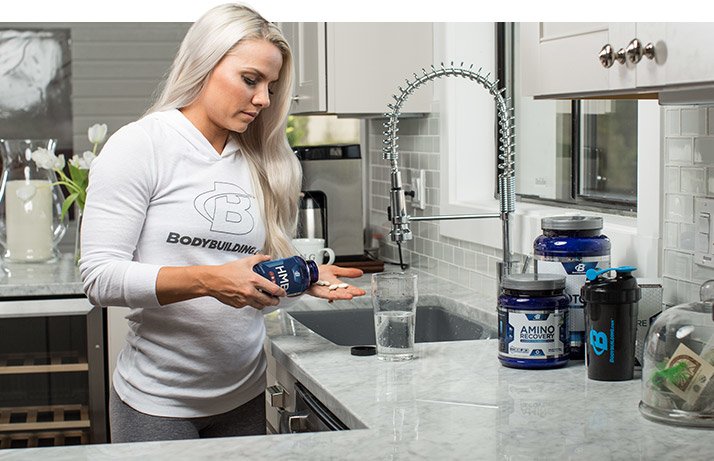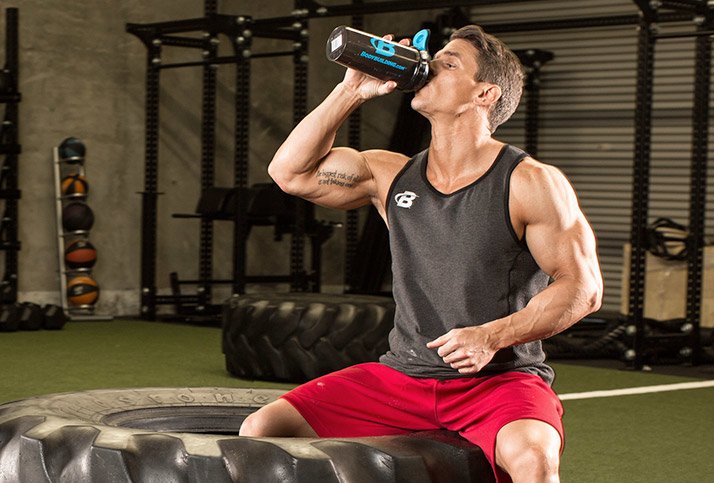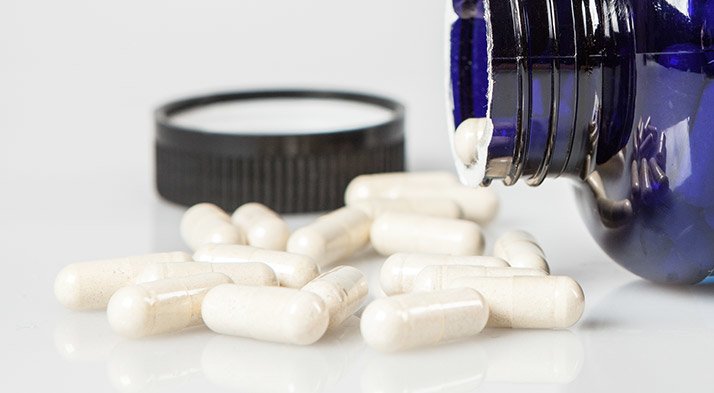
Maintain Your Gains With HMB
HMB can be a beneficial supplement for those who are new to resistance training, or for those ready to take on the challenge of a lifting program.
Newcomers to lifting make gains almost regardless of how well their workouts are put together because everything—from the movements, loads, and volume of work—are a novel training stimulus. Unfortunately, those gains don't last forever, which leaves you looking for new ways to up the ante.
Anyone who's been in the gym for more than a year or two knows you can't keep doing the same things and expect uninterrupted gains. Muscle building and strength building are based on the concept of progressive overload, in which you continue to look for ways to either increase the weight lifted over time, increase the number of reps performed, or reduce the rest periods.
When you change your training stimulus or feel a little extra sore from a new workout, researchers have found one supplement in particular to be immensely beneficial: HMB.
Big Benefits
Beta-hydroxy beta-methylbutyrate, or HMB, appears to work by preventing breakdown of proteins in the muscle. Think about it: When you start a new program, you typically feel more muscle soreness than usual as muscle fibers experience a greater degree of microtrauma. If your primary goal is to add mass to your frame, the last thing you want is greater breakdown of all that hard-earned muscle you've been working for. This is where HMB can work to your advantage.
This means that more protein is spared to help build more muscle. So the idea is that you can train harder and with more intensity, yet experience less muscle breakdown and a quicker recovery. Because HMB helps to reduce exercise-induced muscle damage and speed up the recovery process, you can expect some improvements in your strength, muscle mass, aerobic capacity, and overall fitness when used in combination with a resistance training program.

Will HMB Work for You?
For novice lifters, the research is pretty clear: HMB can have a positive effect on both strength and hypertrophy. A study published in the Nutrition Journal found significant improvements in upper-body strength and reduced muscle damage following four weeks of HMB supplementation combined with a resistance training program.1 The group that supplemented with HMB also saw a three-pound increase in muscle mass and a decrease in percent body fat of 1.1 percent.
Reporting similar findings, researchers out of Iowa State University found significant increases in strength and fat-free mass, and decreases in markers of muscle protein breakdown, following three weeks of HMB supplementation with resistance training.2
For those who have logged endless hours in the gym lifting the iron, the story is a little less clear. The positive effects of HMB for trained individuals depends on two things: the volume of work you're doing in the gym, and how long you supplement. A study published in the Journal of Strength and Conditioning Research had resistance-trained individuals complete a nine-week resistance-training intervention while supplementing with either HMB or placebo. The study found a substantial 9.1 percent increase in lower-body strength in the HMB group, as well as a small effect on fat-free mass.4
However, supplementing for shorter periods may not deliver the same results for individuals who are resistance trained, suggesting that supplementation protocols should last at least two months to see any beneficial changes.5 Additionally, for individuals who aren't actively engaging in higher-volume training programs, the benefits of HMB are less noticeable. But if you are getting ready to start an intense training cycle such as Shortcut To Size, Squat Every Day, or even starting show prep, HMB can give you that extra edge to get you through those tough months and help you stick to your program.
Stack With HMB to Maximize Results
While HMB alone has shown some promising results, there may be additional benefits when paired with the right supplement.

HMB + Creatine
Independently, creatine and HMB can enhance the effects of weight training on muscle strength and size, so it makes sense that combining the two may provide even better results.
Researchers from the Institute of Sport and Physical Education (Poland) examined the effects of creatine, HMB, and the combination of creatine plus HMB on strength and muscle mass in a group of individuals undergoing progressive resistance training. While all groups increased muscle mass and strength, the creatine-plus-HMB group observed greater increases in muscular strength and size, as well as a greater decrease in body-fat percentage.6
HMB + KIC (alpha-ketoisocaproic acid)
Alpha-ketoisocaproic acid, or KIC, is a lesser-known supplement that doesn't appear to be beneficial on its own, but when combined with HMB, it may help prevent protein breakdown and speed recovery. Researchers out of Kingston University (United Kingdom) demonstrated significant reductions in signs and symptoms of exercise-induced muscle damage following eccentric exercise when they gave their subjects a combination of HMB (3 grams) and KIC (0.3 grams) daily for 14 days.7
HMB + ATP
Combining HMB with adenosine triphosphate, or ATP, may be the perfect pairing for bringing about significant changes to your physique. A 2014 study published in the Journal of Strength and Conditioning reported significant improvements in lean body mass, power, and strength following 12 weeks of resistance training in combination with HMB plus ATP supplementation.8

Optimal Timing and Dosage
Typical supplementation protocols for HMB recommend 3 grams per day, split into equal doses of 1 gram taken throughout the day. On training days, I recommend taking one dose immediately after your workout, with the other two doses taken with meals. On nontraining days, just take in 1 gram with breakfast, lunch, and dinner. Because it takes a couple weeks to see the full benefits of HMB, I recommend supplementing for two weeks before you start a new program for optimal results.
While the jury may still be out on HMB supplementation in highly trained individuals, if you're new to the game and looking for a supplement to get you started on the right track—or a veteran of the iron getting ready to enter a particularly intense training cycle—HMB may be worth a try.
References
- Panton, L. B., Rathmacher, J. A., Baier, S., & Nissen, S. (2000). Nutritional supplementation of the leucine metabolite beta-hydroxy-beta-methylbutyrate (HMB) during resistance training. Nutrition, 16(9), 734-739.
- Nissen, S., Sharp, R., Ray, M., Rathmacher, J. A., Rice, D., Fuller, J. C., ... & Abumrad, N. (1996). Effect of leucine metabolite beta-hydroxy-beta-methylbutyrate on muscle metabolism during resistance-exercise training. Journal of Applied Physiology, 81(5), 2095-2104.
- Stout, J. R., Miramonti, A. A., Fukuda, D. H., Wang, R., Townsend, J. R., Mangine, G. T., ... & Hoffman, J. R. (2014). High-intensity interval training and beta-hydroxy-beta-methylbutyric free acid improves aerobic power and metabolic thresholds.
- Thomson, J. S., Watson, P. E., & Rowlands, D. S. (2009). Effects of nine weeks of beta-hydroxy-beta-methylbutyrate supplementation on strength and body composition in resistance trained men. The Journal of Strength & Conditioning Research, 23(3), 827-835.
- Krieder, R. B., Ferreira, M., Greenwood, M., & Wilson, M. (2000). Effects of calcium beta-HMB supplementation during training on markers of catabolism, body composition, strength and sprint performance. Journal of Exercise Physiology, 3(4), 48-57.
- Jówko, E., Ostaszewski, P., Jank, M., Sacharuk, J., Zieniewicz, A., Wilczak, J., & Nissen, S. (2001). Creatine and beta-hydroxy-beta-methylbutyrate (HMB) additively increase lean body mass and muscle strength during a weight-training program. Nutrition, 17(7), 558-566.
- Van Someren, K. A., Edwards, A. J., & Howatson, G. (2005). Supplementation with [beta]-hydroxy-[beta]-methylbutyrate (HMB) and [alpha]-ketoisocaproic acid (KIC) reduces signs and symptoms of exercise-induced muscle damage in man. International Journal of Sport Nutrition & Exercise Metabolism, 15(4), 413-424.
- Lowery, R. P., Joy, J. M., Rathmacher, J. A., Baier, S. M., Fuller Jr, J., Shelley 2nd, M. C., ... & Wilson, J. M. (2014). Interaction of beta-hydroxy-beta-methylbutyrate free acid (HMB-FA) and adenosine triphosphate (ATP) on muscle mass, strength, and power in resistance trained individuals. Journal of Strength & Conditioning Research.




